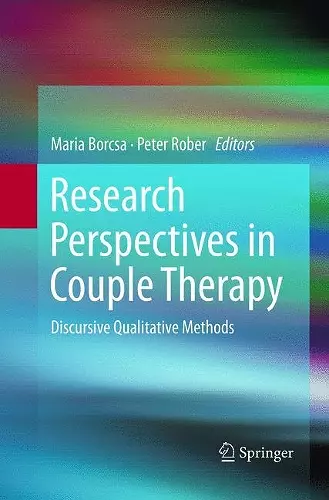Research Perspectives in Couple Therapy
Discursive Qualitative Methods
Peter Rober editor Maria Borcsa editor
Format:Paperback
Publisher:Springer International Publishing AG
Published:30th Mar '19
Currently unavailable, and unfortunately no date known when it will be back

In this powerful volume, six qualitative methods are used to analyze a couple therapy with a troubled young couple, illustrating the intricate processes and sub-processes of therapy through client interactions with their therapists and with each other. Increasingly popular for revealing the nuances and complexity of human interactions, qualitative approaches focus on process and discursive methods which can be particularly rewarding in multi-client settings. Through the examples that make up the text, practitioners and researchers become better acquainted with the power of qualitative perspectives and are encouraged to examine their own views on therapy as they consider these and other concepts:
The development of dialogical space in a couple therapy session.
Introducing novelties into therapeutic dialogue: the importance of minor shifts of the therapist.
Therapists’ responses for enhancing change through dialogue: dialogical investigations of change.
Fostering dialogue: exploring the therapists’ discursive contributions
in a couple therapy.Dominant story, power, and positioning.
Constructing the moral order of a relationship in couples therapy.
Research Perspectives in Couple Therapy: Discursive Qualitative Methods ably demonstrates the balance between therapeutic art and science for family and couples therapists, psychologists, and other mental health professionals in research and practice.
“First, the book is educational. It provides a brief overview of the theory and data analyses for a number of qualitative research methods that can be used to analyse the process of change in couple therapy. … Second, the book prompts reflection on our own understanding of the process of therapy, the ways meaning can be found through conversational processes, and the ways in which discursive analyses help us enhance our understanding of change in therapy.” (Jemima Petch, Australian and New Zealand Journal of Family Therapy, Vol. 38, June, 2017)
ISBN: 9783319794686
Dimensions: unknown
Weight: 454g
176 pages
Softcover reprint of the original 1st ed. 2016